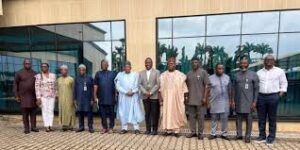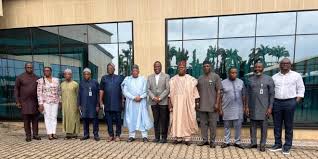In a landmark initiative aimed at transforming Nigeria’s education sector and preparing the nation’s youth for the evolving demands of the oil and gas industry, the Nigerian Content Development and Monitoring Board (NCDMB) and the Universal Basic Education Commission (UBEC) have joined forces. T
The strategic partnership focuses on upgrading basic education and enhancing the skills and capacities of young Nigerians to meet the needs of the ever-changing job market, particularly in the oil and gas sector and its linkage industries.

The partnership was formalized during a meeting on July 23, 2024, at the NCDMB’s Abuja liaison office, where Executive Secretary Felix Omatsola Ogbe hosted his UBEC counterpart, Dr. Hamid Bobboyi. Both leaders expressed a commitment to improving Nigeria’s education system, highlighting the critical role of foundational education in national development.
The discussions centered on how the NCDMB could collaborate with UBEC to upgrade dilapidated primary and junior secondary schools across the country, train teachers, and improve critical facilities. These upgrades aim to equip schools with modern infrastructure and resources, making them more conducive to learning and better aligned with current educational needs.
One of the key projects announced by the NCDMB is the “Back to the Creeks/Villages” initiative. This bespoke capacity-building project aims to revitalize neglected primary schools, particularly in remote areas like the Niger Delta, by enhancing their infrastructure, teaching staff, and curriculum to meet world-class standards. The initiative also focuses on ensuring the sustainability of these interventions by engaging local communities and encouraging them to take ownership of the projects.
Felix Omatsola Ogbe emphasized the strategic importance of starting capacity-building efforts at the basic education level rather than waiting until senior secondary or tertiary education. By focusing on young learners, the initiative seeks to lay a strong foundation for developing the skills needed in the oil and gas industry and other sectors.
Dr. Hamid Bobboyi, Executive Secretary of UBEC, highlighted the pressing challenges facing Nigeria’s basic education system, such as inadequate funding and insufficient government support. He stressed the importance of collaborations like this one with the NCDMB to leverage additional resources and address these challenges effectively.
Bobboyi proposed that NCDMB could assist in developing and equipping Digital Resources Centres and Smart School Solutions across various states, a move aimed at modernizing educational delivery and making learning more accessible and engaging for students.
The partnership between NCDMB and UBEC is guided by a comprehensive approach that includes needs assessment, sustainability planning, execution enablers, and identifying funding sources. Dr. Ama Ikuru, NCDMB’s Director of Corporate Services, noted that the Board’s interventions in education over the past 14 years have been crucial to building the capacities needed for Nigeria’s oil and gas industry and related sectors.
Abdulmalik Halilu, NCDMB’s Director of Monitoring and Evaluation, emphasized the importance of ensuring that all collaborative efforts are sustainable and aligned with community needs. He pointed out that engaging local communities and stakeholders is essential for the success and longevity of these educational projects.
The collaboration between NCDMB and UBEC marks a significant step towards transforming Nigeria’s basic education landscape and preparing young Nigerians for future challenges. By focusing on upgrading schools, training teachers, and developing digital resources, the partnership aims to create a robust educational foundation that will drive economic growth and social development.
As Nigeria continues to navigate the complexities of a rapidly changing global economy, initiatives like the “Back to the Creeks/Villages” project serve as a testament to the nation’s commitment to investing in its human capital and building a brighter future for all Nigerians. The success of this partnership could pave the way for similar collaborations, fostering a more dynamic and resilient educational system across the country.




